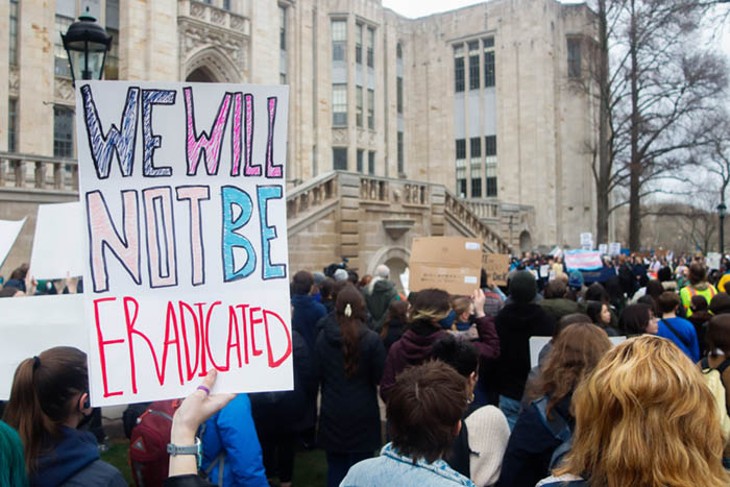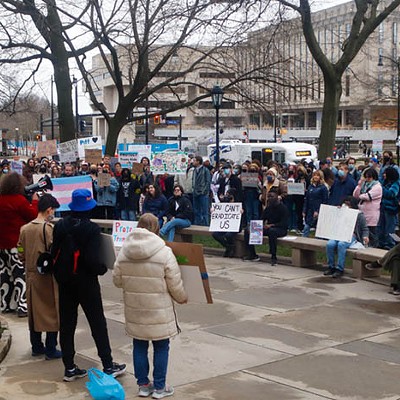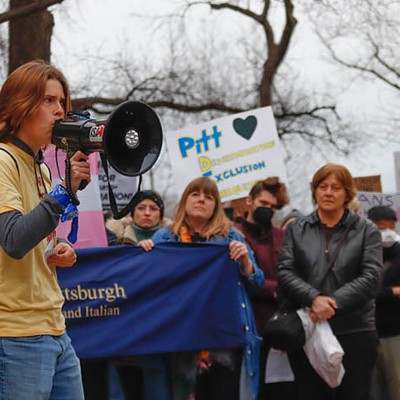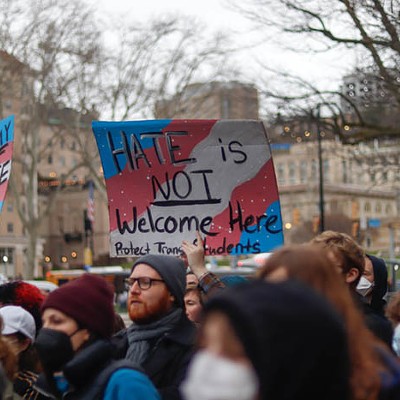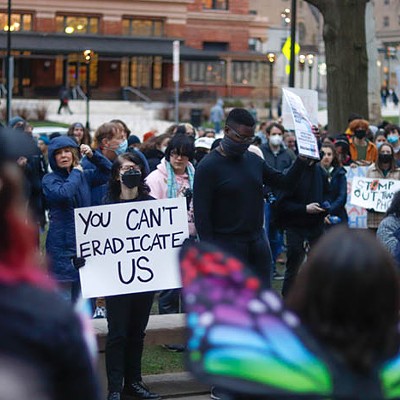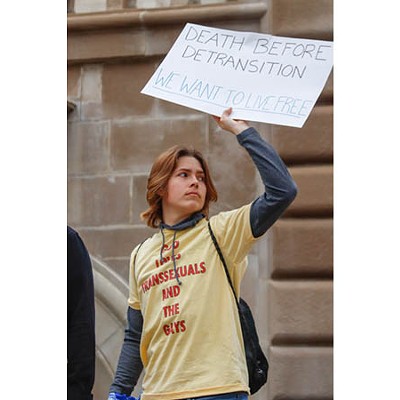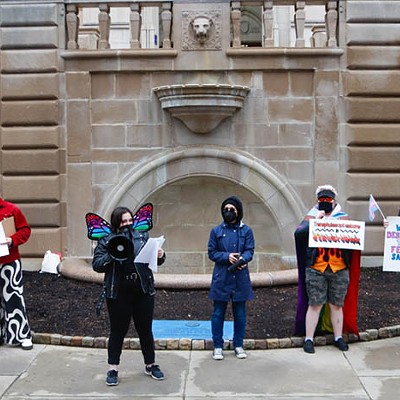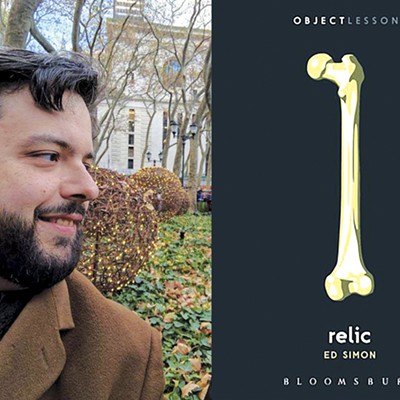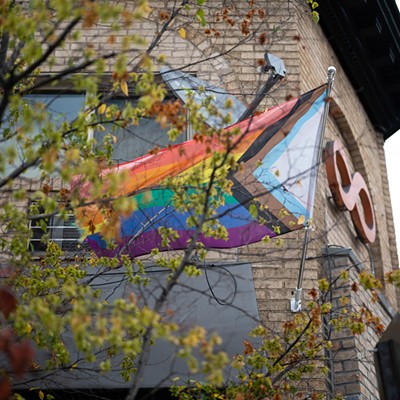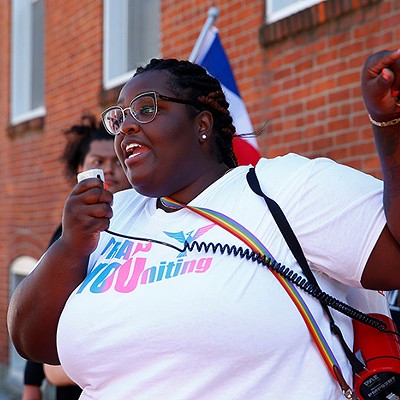More than 2,500 people have signed a petition circulated by students at the University of Pittsburgh objecting to upcoming events featuring speakers who “advance a platform of hate and transphobia.”
The petition argues that the planned events are “against the values” of the university's stated commitment to diversity and inclusion.
Two of the events named in the petition are organized by the Pitt chapter of Turning Point USA, a right-wing youth group. An event called “Save Women’s Sports” will feature Riley Gaines, a swimmer who advocates for the exclusion of trans women from women’s sports. The petition claims the event is scheduled for the first day of Pitt’s Pride Week.
Inviting Gaines to speak on campus “pushes the narrative that trans women are not women, invalidates their existence, and threatens their safety,” according to the petition.
Another event, scheduled to take place in the O’Hara Student Center, is planned by an outside organization, the Intercollegiate Studies Institute, and is billed as a “debate on transgenderism and womanhood.” Headlining this event is Michael Knowles, a conservative activist who recently called for the eradication of transgender people from public life.
The organizers of the petition tell Pittsburgh City Paper that the existence of transgender people is not up for debate.
“There’s no such thing as a debate over transness. Trans people have existed for centuries,” says senior Nick Demjan, who helped draft the petition. “Having that type of rhetoric in a university building where we're trying to build a community full of diverse people and to know that the university hires many queer and trans individuals, is deeply concerning.”
Kelisa Hysenbegasi, another student who worked on the petition, tells City Paper she was moved to action because “transgender individuals and members of the queer community on Pitt’s campus are more likely to be victims of sexual violence and discrimination,” according to a 2019 survey of Pitt students.
University of Pittsburgh spokesperson Jared Stonesifer tells City Paper in an emailed statement that permitting the events to take place on campus is a matter of free speech and not a reflection of institutional values.
Stonesifer says that Pitt acknowledges that “legally protected speech and expression can at times offend and marginalize some members of our community and contradict unwavering university values,” but says that registered student organizations such as Turning Point are permitted to invite whomever they want to speak on campus, provided they follow university guidelines and the law.
Stonesifer says Pitt “encourage[s] intellectual critique of and peaceful dissent from opposing viewpoints, counterspeech, and disengagement from experiences that do not support personal well-being. … Student organization use of Pitt property is not an institutional endorsement of the event or the speaker’s expressed viewpoint.”
Demjan and Hysenbegasi tell City Paper they find Pitt’s response hypocritical, given the university’s professed commitment to prohibiting gender discrimination, and argue that the invited speakers’ rhetoric is hate speech.
“I don’t think free speech involves debating the existence of someone else,” Hysenbegasi says.
Statements made by Knowles, in particular, Demjan argues, are best described as an incitement to violence against trans people and are therefore not legally protected.
In recent years, the university has made multiple public statements toward creating a more inclusive and tolerant campus. A strategic plan released in 2021 states, “We aspire to be a university community that embodies diversity and inclusion as core values that enrich learning, scholarship and the communities we serve.”
Demjan and Hysenbegasi say Pitt’s inaction in this situation calls those commitments into question.
“It just really makes you think, do they actually care? Or is it just kind of like a publicity stunt?” Hysenbegasi asks
Demjan says if Pitt chooses to allow transphobic speakers to be invited to campus, “they need to take down all of their diversity and inclusion statements… either remove them or act in accordance with their very own policies."
Other students echo this.
Aubrey Kobayashi, a graduate student in Pitt’s School of Computing and Information, tells City Paper that, given escalating legislative efforts “to deprive trans people of all material support and the right to exist in public,” the university has a moral obligation to intercede to stop the spread of the rhetoric underpinning those laws, even if it means they might get sued.
“If Pitt is genuine around its commitments to diversity, equity, and inclusion, the administration should be more than willing to expose themselves to legal liability as a gesture toward solidarity and care to its trans students, workers, and community,” she says. “If Pitt has the money in the millions to pay a law firm to suppress underpaid and exploited graduate student workers who simply want a union, what is actually stopping them from doing less than the bare minimum to ensure the safety and wellbeing of their trans community?"

